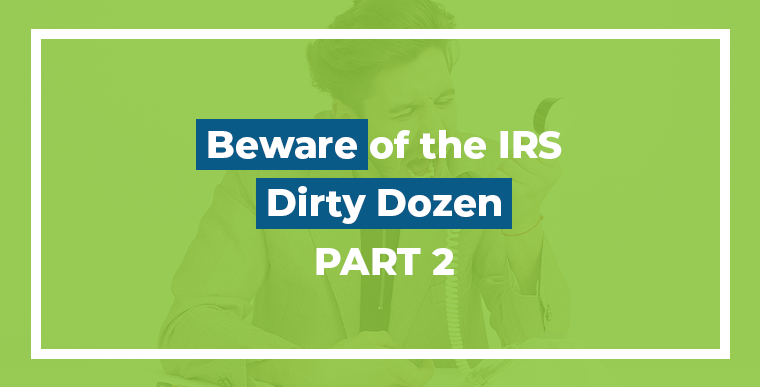
Taxes are a tremendous portion of the economy. If you think about it, New Yorkers pay between 1/5 and 1/3 of their income on average in taxes. Thought of another way, we work between 2.4 and 4 months of the year just to pay taxes.
It is no wonder then that unscrupulous individuals would see tax dollars as an easy target to try to and steal someone else’s hard-earned money. The IRS is highly aware of the many different scams that are out there and does a lot of work to try to warn and educate the public about them.
Every year, the IRS identifies the top 12 and releases a list dubbed the IRS Dirty Dozen. In last week’s article I listed the first 6 and below are the next 6, to help you be more aware of them.
Remember, the IRS will never call, text or email asking you to verify or enter information. The IRS always initiates communication via mail.
- Fraudulent Form Filing and Bad Advice on Social Media – the IRS warns that inaccurate advice around the well known Form W2 and more obscure Form 8944 is used to encourage people to give up their information in hopes of getting a larger refund.
- Spearphishing and Cybersecurity for Tax Pros – We covered phishing attempts last week, which is where a bad actor gets a victim to share their personal information by impersonating the IRS or its website. Spearphishing is when phishing attempts target a specific entity type, in this case Accounting Professionals. The bad actor tries to steal the Tax Pros’ client data to file fraudulent returns on their behalf. Although this one is on the Tax Pro to be aware of, you can ask your tax pro what means they have in place to protect your data.
- Offer in Compromise Mills – Like the name puppy mill, these are shops that are trying to push through as many OICs as they can. They often are advising taxpayers on their eligibility when they really do not meet the requirements which ends up costing the taxpayer thousands of dollars.
- High Income Filer Scheme – Two schemes aimed at high income filers are charitable remainder annuity trusts (CRAT) and monetized installment sales. A CRAT lets individuals donate assets to charity using an irrevocable trust and then draw annual income from them for a period of time. The promoters sometimes misuse these trusts to eliminate income and taxable gains. The monetized installment sale is where promoters try to spread the income from the sale of an asset over a period of time. They generally charge a fee for this.
- Bogus Tax Avoidance Strategies – Two major bogus strategies are listed by the IRS. The first is micro-captive insurance arrangements, where the insurance company’s owners elect to be taxed on the captive’s investment income only. Abusive micro-captive’s usually lack many of the attributes of legitimate insurance. The second is syndicated conservation easements where for a fee the conservation easement will be grossly inflated to try to increase the charitable deduction you will be taking.
- Schemes with International Elements – The IRS points to 3 major schemes here. The first is a very public and real problem for enforcement actions today and that is the practice of using offshore accounts and virtual currency to conceal income. The second is using Maltese IRA accounts and then improperly reporting them as a deduction for pension plan earnings using the Maltese treaty with the US. The 3rd one mentioned is Puerto Rican and foreign captive insurance. Similar to item 11 above, these insurance companies lack many of the attributes of a legitimate insurance company.
Even smart and educated people can fall victim to these scams. What is scary, is that many of these sound like really smart advice, the desire to reduce your tax liability will potentially blind you to the due diligence you should be doing. The more informed you are, the less likely you become a victim.
If you want a reputable tax preparer that has your back, please contact my office and we can discuss how we provide personalized and reputable assistance with your unique tax situation. See our full-page ad in this week’s magazine.


